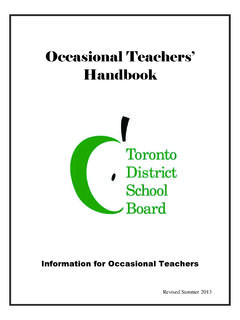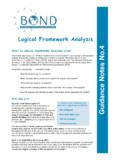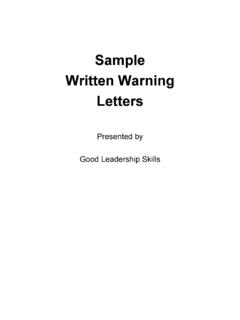Transcription of Does Self-Discipline impact students’ knowledge and learning?
1 does Self-Discipline impact students knowledge and learning? Yue Gong, Dovan Rai, Joseph E. Beck and Neil T. Heffernan Computer Science Department, Worcester Polytechnic Institute Abstract. In this study, we are interested to see the impact of Self-Discipline on students knowledge and learning. Self-Discipline can influence both learning rate as well as knowledge accumulation over time. We used a knowledge Tracing (KT) model to make inferences about students knowledge and learning.
2 Based on a widely used questionnaire, we measured students level of Self-Discipline . When we analyzed the relation of students Self-Discipline with their knowledge attributes, we found that high Self-Discipline students had significantly higher initial knowledge , but there is no consistent relationship of learning while using the tutor. Moreover, higher Self-Discipline students seemed more careful with respect to making careless mistakes. 1 Introduction Intellectual attributes ( , long term memory, ability to think abstractly) and nonintellectual attributes ( , motivation, Self-Discipline ) both contribute to a student s academic performance [1].
3 Intelligent Tutoring Systems (ITS) have focused on cognitive aspects over last 25 years and are now becoming increasingly aware of non-cognitive traits like motivation, engagement, flow etc. [5,6]. However, Self-Discipline is still not a major area of exploration in ITS though it has been one of the key areas in psychology and sociology [8,9]. Given that a lot of such large-scale psychosocial studies have been able to demonstrate a positive relation of Self-Discipline with performance and achievement, we were interested in two questions: does Self-Discipline have a significant impact when it comes to knowledge acquisition within ITS?
4 does the ITS community need to consider Self-Discipline while designing ITS? In this paper, we are trying to use educational data mining technique with fine grained models to get a crisper look at the impact of Self-Discipline on students cognitive aspects. We used knowledge tracing (KT) [3], an established approach to model student knowledge . We can observe students performance in an ITS over a period of time and make inferences about their latent characteristics like knowledge level and learning across the time.
5 Once we detect those attributes, we can see the impact of Self-Discipline on the immediate learning and prior accumulation. Besides learning, Self-Discipline can influence other attributes like consistency and carefulness that can improve performance given the same content knowledge . 2 Methodology For this study, we used data from ASSIST ment, a web-based math tutoring system. We used the data from 171 twelve- through fourteen-year old 8th grade students in urban school districts of the Northeast United States.
6 These data consisted of 74,394 log records of ASSIST ment during the period Jan 2009-Feb 2009. We recorded performance records of each student across time slices for 106 skills ( area of polygons, Venn diagram, division, etc). Educational Data Mining Measuring Self-Discipline For exploring student individual differences in Self-Discipline , we employed a questionnaire survey, Brief self -Control Scale (BSCS; [9]) in December 2008 before the students used the tutor. BSCS is a 13-item questionnaire to measure self -regulatory behavior in four domains: thoughts, emotions, impulses, and performance.
7 Each question ( I am lazy , I am good at resisting temptation ) asks the respondent to choose from a 5-point Likert scale answer list: a. Very much like me, b. Mostly like me, c. Somewhat like me, d. A little like me, e. Not like me at all. We assigned each response -2, -1, 0, +1, +2 points respectively. We dropped an original survey question ( I wish I had more Self-Discipline . ) as we find difficult to interpret whether agreeing this statement would imply high Self-Discipline or low.
8 Lie test While using self -report measures, we have no way of ensuring that respondents don t lie or answer haphazardly. Therefore, we created three criteria to detect lies and out of total 171 students we dropped 31 from our analyses. 1. The questionnaire asked students for their gender. Twelve students gave an incorrect response. Suspecting them not being serious about the survey, we excluded those students from our study. 2. Some students might be randomly picking answers and therefore we checked for consistency in their answers.
9 Among 12 questions in the survey, for 8 of them Very much like me implies low Self-Discipline ( I have a hard time breaking bad habits ), and for 4 of them, Very much like me implies high Self-Discipline ( I am good at resisting temptation ). For both types of questions we used the scoring system in Section If a student answered Very much like me for a question of the first type, he received -2 points. If he answered Not like me at all for a question of the second type, he received +2 points.
10 The two responses consistently tell that he has low Self-Discipline . The sum is zero. But if he had answered Very much like me in the second type, the answers are not consistent and the sum of responses is -4. Similarly, if he had answered Not like me at all in both questions, that would be still inconsistent and sum would be +4. 3. For each student, we took average of points in both types of questions (since the groups are of unequal size) and summed the two averages and calculated the absolute value.







